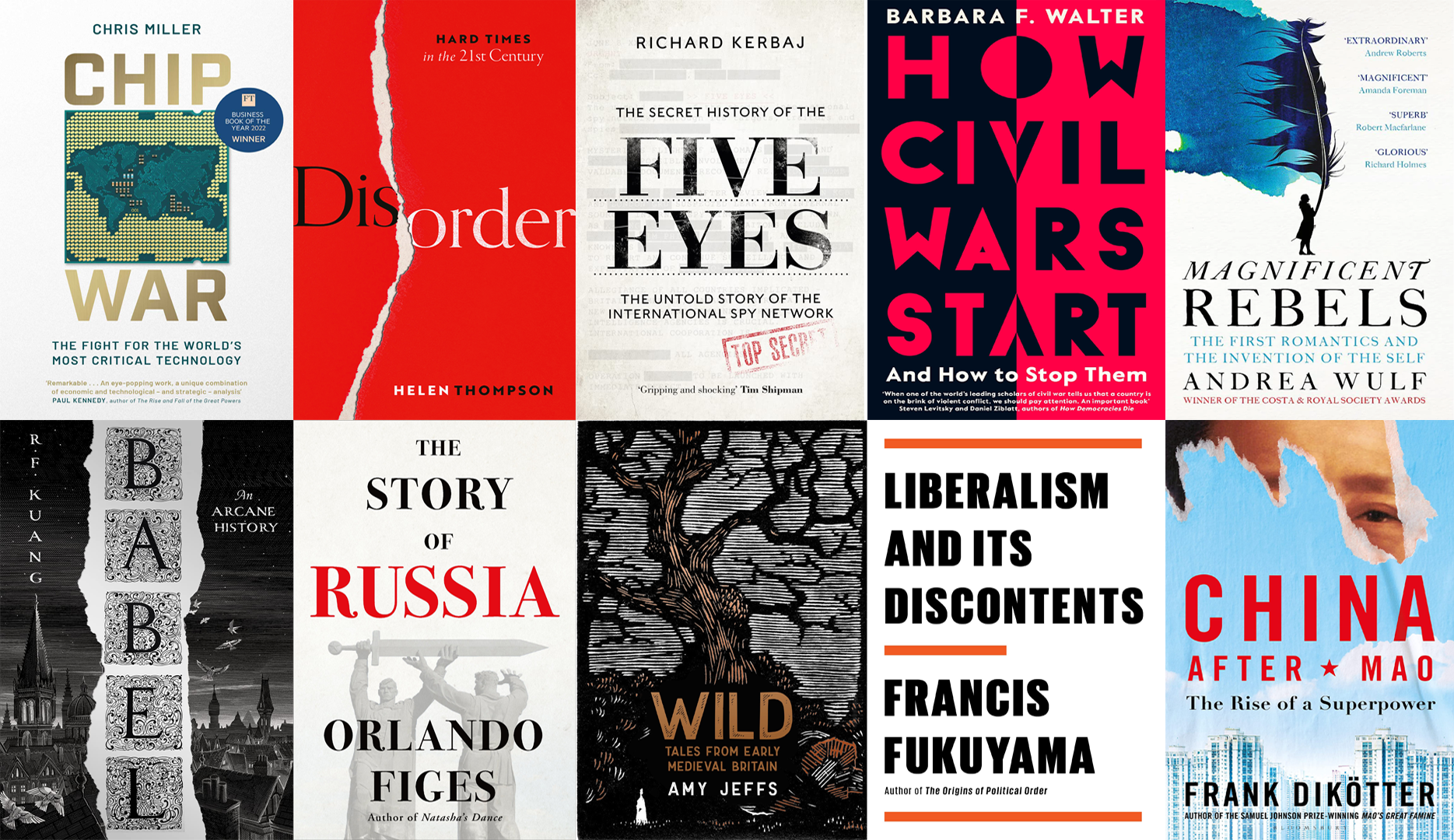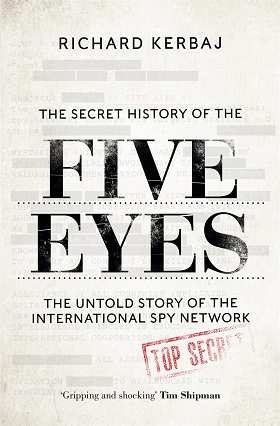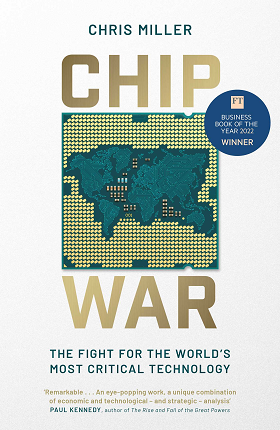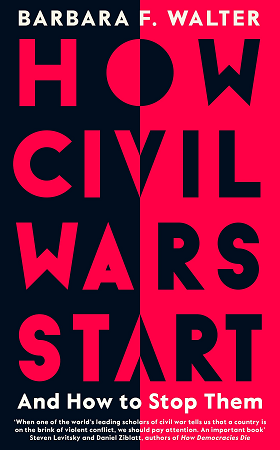10. The Secret History of the Five Eyes by Richard Kerbaj
Less a sweeping narrative history and more a person-by-person account of the intelligence services that netted together to form the Five Eyes, a network spanning the agency corridors of Australia, New Zealand, Canada, the US and Britain.
Stooped in detail, the History of the Five Eyes lets loose a stream of characters ranging from Scottish maids turned German informer, to Soviet defectors, to following the codebreakers at Bletchley Park.
The book is an impressive account of how an informal spy network came to dominate the intelligence agency landscape, documenting such events as the almost absolute Soviet infiltration of the Australian Secret Intelligence Service, to the cracking of the Purple Cipher, which allowed the US Navy to outmanoeuvre the Japanese in the Battle of Midway.
9. Liberalism and Its Discontents by Francis Fukuyama
In his latest book, Fukuyama has crafted an overview of the state of liberalism in the world in 2022. Giving a historical overview of the origins of liberalism in Western culture, and how it evolved into the global moral system that it is today. After the invasion of Ukraine at the beginning of this year, the book feels all the more relevant as the balance of power has shifted towards the democratic world after an authoritarian resurgence.
The strengths of the book are its analysis of the weaknesses of liberalism in its current form, beset by neoliberalism and identity politics from the left and the right. It also deals with the specific threats from big tech and free speech in the modern world.
Some might find it betrays part of the author’s political bias a little too much, and that it is a short summary of his views compared to his earlier books, but if one wanted to find a guide to the state of the political order in 2022, there are few better to recommend.
8. Wild by Amy Jeffs
Delving into the rich myth that make up the British isles in Storyland (2021), Jeffs produced a shorter book laying bear the tales that populated the livelihoods of those living in medieval Britain,
Inspired by old English and Welsh poems, Wild carves a path around the British landscape through the perspective of contemporaries.
Jeffs is able to present British myth as distinct from Viking and Irish mythology, although the two are constantly interweaving throughout this period, allowing for a short but sweet account of the British hinterland.
7. The Story of Russia by Orlando Figes
Figes is a prolific writer of Russian history. He does not fail to disappoint with his latest release, which charts the entire course of the country’s history, from its formations under the Kyievan Rus and trade with Constantinople to the reigns of the Russian Tsars and, finally, the World Wars, the Soviet Union and Putin’s Russia.
The book offers Figes insight into the Ukraine War, with the book ending in April 2022 when it looked as though Kyiv was close to buckling under waves of Russian assault.
While not all readers will agree with its conclusion, Figes has much to offer anyone with even a cursory interest in Russian history. He is capable of weaving in and out between detailed descriptions of Russian life, the tribulations of its many rulers, before offering broad brushstrokes of centuries worth of time.
His descriptions of how the old gods worshipped by the Kyivan Rus and Viking raiders become canonised as Christian saints is particularly worthwhile, as well as his analysis of the Boyar ‘feeding’ system that Figes claims sets the precedent for the corruption Russia suffers today.
6. Chip War by Chris Miller
Coming soon after recent chip sanctions against China, and growing threats against Taiwan, this book is essential to understanding the most important struggle in the modern world.
The book does an excellent job of condensing a highly complex topic into a simple format. As the book mentions, today about 4 chip companies control more than 90% of the world’s global supply, each one an essential part of the production process. Representing one of the most tightly controlled supply chains in history.
China is in a desperate struggle to copy the technology that exists just miles away from its coast and if it succeeds the results would be world-changing. The book outlines the history of the microchip industry and its development as part of the competition between the West and East Asia, examining possibilities for the future. It is undoubtedly one of the most important books written in the last few years and will be studied well into the future.
5. How Civil Wars Start - Barbra Walter
While upon first glance this book might seem concerned predominantly with US politics, Barbara spends most of it steering clear of debates around the January 6th Capitol Riots, impeachment and electoral disputes.
One of the book’s strengths is its ability to focus in on a conflict, such as conflicts between native indigenous Assamese and Indian migrants, and extrapolate them into wider conversations into the causes of civil strife.
Ethnic tensions caused by migration in West Papua serve as an insight into how government police exacerbate conflict, whereas a coup in Myanmar illustrates how social media can undermine democracy in developing nations.
The breakup of Yugoslavia and subsequent clashes, as well as Syria’s civil war, also feature heavily.
Barbara’s key achievement is her ability to distil political science to quantify conflict and make accurate predictions about emerging democracies.
While taking hot political topics, the techniques laid out in the book allow the reader to more efficiently gauge the geopolitical landscape and see for themselves where democracy might be headed.
4. Magnificent Rebels by Andrea Wulf
There are certain moments in history where a specular quantity of extraordinary people accumulated in one particular place.
One wonders what it must have been like to live in that place at that particular moment — with 470s Athens, 1920s Paris, or 500s Luoyang all coming to mind.
Jena in the 1790s is another example, where such a collection of people were living within walking distance of each other, that one can’t help but wonder whether it was something in the air of Saxon-Wiemar.
The novel traces the story of the final years of the “Jena Set”, the young 18th century German romantics that came to dominate intellectual life in late 18th century Germany.
Led by Caroline Schelling, a German academic who became entangled with revolutionaries during the French occupation of Mainz in 1793, the Jena set is made up of writers and philosophers such as Goethe and Fichte — the intellectual inheritor of Kant’s philosophy — as well as poets and scientists like Schiller, and Schleiermacher.
The book offers a great narrative insight into one of the most fascinating microcosms of German history.
3. China After Mao by Frank Dikotter
Frank Dikotter’s latest book feels like a narrative completion of his life’s work documenting the 20th century history of China. While probably known as the greatest historian of modern China his analysis still feels surprising. Dikotter sees China’s supposed rise in the late 20th century as something of an illusion, pointing out the fact that the country barely kept pace with global economic growth up until the 2000s, and sees its subsequent growth as a temporary deviation from the norm. Many of his opinions place him at odds with most other scholars of Chinese history, which means the book will be a surprise even for those already familiar with the topic, analyses of the Tiananmen square massacre and the rise of Xi Jinping are still very eye opening. Anyone who wants to understand how the Chinese state emerged as it is today should pick it up.
2. Disorder: Hard Times in the 21st Century by Helen Thompson
Few non-fiction books require as much thought put aside to think through their implications as Disorder. On more than one occasion, I was forced to put the book aside in order to fully think-through its conclusions.
Disorder offers a clear-headed history of energy policy, refusing to let up with its factual analysis of how oil and gas shaped the 20th and 21st centuries.
Calling the book timely would seem somewhat flippant, but reading it in light of Russia’s weaponisation of oil and gas allows for a fascinating perspective on how we arrived at the world we inhabit today.
While heavy going at times, it also gives a fascinating account of the monetary systems which evolved to adapt to a world shaped by energy policy, forecasting how energy transition away from cheap energy and to renewables could change our future.
Babel by R.F. Kuang
Babel is good at hiding its own premise. Imagine 1880s Britain at the height of empire, where new territories are being acquired as quickly as new products invented.
Now, imagine that instead of coal and steam, what powers the empire’s pistons are translations. Rather, what powers the machinery is what is lost through translation.
A series of specialised translators are able to access what they call ‘the realm of perfect meaning.’
Whenever a word is translated, whatever is lost through translation, the ‘pure meaning’, escapes into this realm.
If a translator can capture it, what is lost becomes a powerful force, able to power steam boats, ignite cannon or renew fertiliser.
But the more commonly understood the language, the weaker its power. The more obscure, the greater the potency. In order to sustain itself, the empire pushes into the far regions of earth in a quest to discover and translate ever-more unknown languages.
A native of Canton, China, the protagonist arrives in Oxford having been ‘sponsored’ by an Oxford professor intent on training him to become a translator of his native Mandarin.
Only the Qing Emperor, who holds large quantities of the materials needed to allow the ‘realm of perfect meaning’ to be accessed, has prohibited Chinese citizens from teaching foreigners Mandarin under pain of death.
The quest to access the realm of meaning is tied in with 19th century ideas of Biblical genealogy. The translators, trained predominantly at Oxford, believe in the search for the ‘Adamic language’.
The Adamic language is that spoken by Adam and Eve, before the destruction of the Tower of Babel set new languages flourishing in every corner of the globe.
Only when every language has been uncovered and accurately translated can the Adamic language, the language used to communicate with God, be rediscovered.
Kuang offers a sophisticated magic system combined with likeable characters and a comprehensive and well realised world. We are pleased to name it Rough Estimate’s favourite book of 2022.
Honourable Mentions
Leadership by Henry Kissinger
Archaeology and the Genetic Revolution in European Prehistory by Cambridge Press
Stella Maris/The Passenger by Cormack McCarthy
What We Owe the Future by William MacAskill
The Economic Weapon by Nicholas Muller
The Dragons and the Snakes by David Kilcullen
Lessons by Ian McEwan
The Hero of Two Worlds by Mike Duncan










